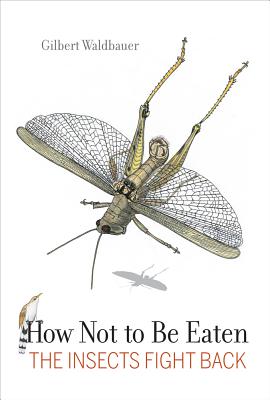

 University of California Press
University of California Press
How Not to Be Eaten: The Insects Fight Back


Key Metrics
- Gilbert Waldbauer
- University of California Press
- Hardcover
- 9780520269125
- 9 X 6.3 X 0.6 inches
- 1 pounds
- Science > Life Sciences - Zoology - Entomology
- English
 Secure Transaction
Secure TransactionBook Description
Author Bio
Gilbert P. Waldbauer (1928- ) served as Professor of Entomology (1960-1995) at the University of Illinois. He studied agricultural pests, pest management, mimicry, and insect mating but he also wrote books on biology and entomology for the general public. Throughout his career Professor Waldbauer worked internationally as a researcher and government consultant.
Gilbert P. Waldbauer was born on April 18, 1928, in Bridgeport, Connecticut. He served in the U.S. Army Honor Guard to General Douglas MacArthur from 1946 to 1947, and was stationed in Tokyo, Japan, during this time. Upon returning to the U.S., Waldbauer completed his Bachelor of Science degree in entomology in 1953 at the University of Massachusetts. He then earned his Master of Science and Ph.D. in entomology at the University of Illinois at Urbana-Champaign, in 1956 and 1960, respectively.
Waldbauer served as a professor of entomology (1960-1995). He toured the country speaking about natural history for the Massachusetts Conservation Council (1952-1953). He was an associate member of the Center of Zoonoses Research (1963-1964) and a research affiliate in entomology at the Illinois State Natural History Survey (1970). Internationally, he was a visiting scientist at the Instituto Colombiano Agropecuario in Palmira, Columbia (1971); a senior scientist at the International Rice Research Institute in the Philippines (1978-1979); and a USAID consultant to the Pakistan Agricultural Research Council in Islamabad, Pakistan (1985).
Professor Waldbauer is nationally and internationally recognized for his research into the adaptive significance of individual and group behavior among insects, including cecropia moths, bean leaf beetles, whiteflies, South American stink bugs, and corn earworms. During his career, Waldbauer authored and co-authored more than 100 academic articles. He also served as a reviewer for the National Science Foundation, and he was awarded grants from U.S. Department of Agriculture and the National Geographic Society for his research on agricultural pests and pest management.
Since his retirement, Waldbauer has published several popular science books, including Insects through the Seasons (1996), The Handy Bug Answer Book (1998), Birder's Bug Book (1998), Millions of Monarchs, Bunches of Beetles: How Bugs Find Strength in Numbers (2000), What Good are Bugs? Insects in the Web of Life (2003), Insights from Insects: What Bad Bugs Can Teach Us (2005), A Walk around the Pond: Insects in and over the Water (2006), and How Not to Be Eaten (2012).
Source: University of Illinois Archives
Videos


Community reviews
Write a ReviewNo Community reviews